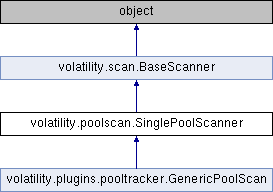
Public Member Functions | |
| def | object_offset (self, found, address_space) |
| The name of this function "object_offset" can be misleading depending on how its used. More... | |
| def | scan |
 Public Member Functions inherited from volatility.scan.BaseScanner Public Member Functions inherited from volatility.scan.BaseScanner | |
| def | __init__ |
| def | check_addr (self, found) |
| This calls all our constraints on the offset found and returns the number of contraints that matched. More... | |
| def | scan |
Additional Inherited Members | |
 Public Attributes inherited from volatility.scan.BaseScanner Public Attributes inherited from volatility.scan.BaseScanner | |
| buffer | |
| window_size | |
| constraints | |
| Build our constraints from the specified ScannerCheck classes: | |
| error_count | |
 Static Public Attributes inherited from volatility.scan.BaseScanner Static Public Attributes inherited from volatility.scan.BaseScanner | |
| list | checks = [] |
| int | overlap = 20 |
| def volatility.poolscan.SinglePoolScanner.object_offset | ( | self, | |
| found, | |||
| address_space | |||
| ) |
The name of this function "object_offset" can be misleading depending on how its used.
Even before removing the preambles (r1324), it may not always return the offset of an object. Here are the rules:
If you subclass PoolScanner and do not override this function, it will return the offset of _POOL_HEADER. If you do override this function, it should be used to calculate and return the offset of your desired object within the pool. Thus there are two different ways it can be done.
Example 1.
For an example of subclassing PoolScanner and not overriding this function, see filescan.PoolScanFile. In this case, the plugin (filescan.FileScan) treats the offset returned by this function as the start of _POOL_HEADER and then works out the object from the bottom up:
for offset in PoolScanFile().scan(address_space):
pool_obj = obj.Object("_POOL_HEADER", vm = address_space,
offset = offset)
##
## Work out objects base here
##
Example 2.
For an example of subclassing PoolScanner and overriding this function, see filescan.PoolScanProcess. In this case, the "work" described above is done here (in the sublcassed object_offset). Thus in the plugin (filescan.PSScan) it can directly instantiate _EPROCESS from the offset we return.
for offset in PoolScanProcess().scan(address_space):
eprocess = obj.Object('_EPROCESS', vm = address_space,
native_vm = kernel_as, offset = offset)